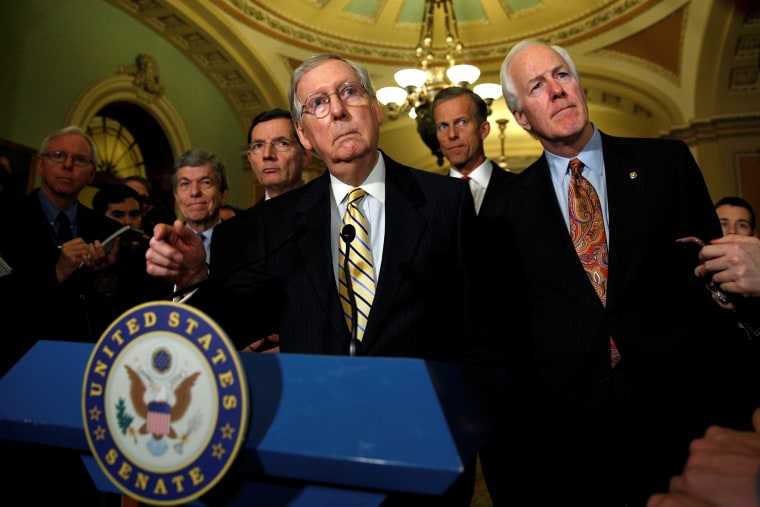There have been rumors for weeks that Senate Republicans might keep the chamber in session through the summer, canceling plans for an August recess, and yesterday, the GOP leadership did exactly that.
Senate Majority Leader Mitch McConnell announced Tuesday that he is canceling most of the Senate's annual August recess.The Kentucky Republican attributed his decision to "the historic obstruction by Senate Democrats of the president's nominees and the goal of passing appropriations bills prior to the end of the fiscal year," which is Sept. 30.
Let's put aside the irony of the Kentucky senator complaining about "historic obstruction" -- McConnell is a pioneer without equal when it comes to implementing obstructionist tactics -- and consider what's driving all of this.
In a written statement, McConnell said senators "should expect to remain in session in August to pass legislation, including appropriations bills, and to make additional progress on the president's nominees."
But as NBC News' report made clear, Senate Majority Whip John Cornyn (R-Texas) was even more candid about his party's plans, telling reporters the chamber will focus its attention in August on "nominations, nominations, nominations."
That's very easy to believe. In fact, all things being equal, McConnell would probably prefer not to cancel the August recess -- and I'm not convinced yesterday's announcement was his final word on the subject.
What the Majority Leader wants is to approve as many of Donald Trump's nominees, most notably judicial nominees, as possible before the end of the year. The Senate's Democratic minority, taking advantage of every tactic it can think of -- including tactics Dems learned from watching McConnell -- is pushing in the opposite direction.
The GOP leader's statement yesterday was effectively McConnell's way of telling Democrats, "If you're going to interfere with votes on White House nominees then I'm going to interfere with your plans for August."
Or put a different way, if Senate Dems were to ease up on their procedural tactics, McConnell would probably schedule more time away from Capitol Hill over the summer.
Indeed, there's some precedent for this: as Slate's Jim Newell noted yesterday, "Last year, McConnell proposed cutting two weeks of August recess, and the place freaked out. Democrats agreed to quickly move through dozens of nominations en bloc, and only one week of recess ended up being canceled."
That may yet happen again, though Senate Democratic leaders acted yesterday as if they were delighted by McConnell's announcement, and they're looking forward to working a full summer. In fact, Senate Minority Leader Chuck Schumer (D-N.Y.) said Dems will spend a month pitching measures intended to help health care consumers hurt by Republicans' recent changes.
Complicating matters, of course, is the fact that this is an election year, and incumbents are eager to spend as much time as possible in their home states. As McConnell knows, this cuts in the GOP's favor: only two Senate Republicans seem at all concerned about their re-election prospects this year -- Nevada's Dean Heller and Texas' Ted Cruz -- while Democrats have a small army of incumbents desperate to hit the campaign trail, and many of them face uphill climbs in red states.
Some of the electoral considerations are probably overstated, since it's tough to win or lose a statewide campaign three months before Election Day, based solely on time spent on the campaign trail. But nervous senators may yet take steps to change yesterday's announcement from McConnell.
Postscript: Someone asked me yesterday whether the plan to cancel the August recess is unprecedented. It's not. In fact, the August recess is a relatively modern invention: before air conditioning, Capitol Hill tended to be empty over the summer.
Climate control changed the nature of Senate work, and starting in the 1950s, senators worked year-round. It wasn't until 1970 that the August recess became a normal part of the congressional calendar.
